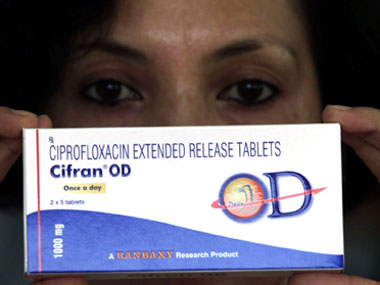Ranbaxy’s stock has taken a beating on news of the company having to shell out $500 million as settlement amount for manufacturing violations with US authorities.
US prosecutors in their court documents said that Ranbaxy made ‘adulterated, potentially unsafe’ medicines that were illegal to sell.
A decree signed on 20 December 2011 and filed by the Department of Justice in federal court in Maryland on 25 January 2012 requires Ranbaxy to relinquish 180-day marketing exclusivity for three pending generic drug applications. Court documents do not identify the affected medicines.
Analysts, however, have taken their pick on the drugs that will be affected. In a report on the event, Kotak has said that the product could be Takeda Pharmaceutical’s Actos diabetes pill which could have generate $200 million in revenue for Ranbaxy. The drug had a global sales of$4.7 billion and goes off-patent from August 2012.
[caption id=“attachment_195621” align=“alignleft” width=“380” caption=“US prosecutors in their court documents said that Ranbaxy made ‘adulterated, potentially unsafe’ medicines that were illegal to sell.”]  [/caption]
Credit Suisse AG in their report has said that one of the drug can be Nexium, a heart-burn treatment sold by Astra Zeneca Plc (AZN) that has global sales of $5 billion in 2010. Nexium was the largest remaining product in Ranbaxy’s pipeline which was to be launched in May 2014.
Nomura said that near term exclusivities include the sleep disorder drug Provigil, which has a $1.1 billion sales in 2010, Actos and Diovan, a blood pressure pill made by Novartis that generated $1.5 billion in annual sales.
Impact Shorts
More ShortsThe consent decree mentions that out of the eight ANDAs (abbreviated new drug applications) on which Ranbaxy was First to File (first in line to get the 180-day exclusivity once the drug goes off-patent) the company has lost exclusivity on three. If Ranbaxy does not implement certain changes by a specified date, five other generic drug applications are at risk.
The bigger issue here is the time that will be taken by the company to resume manufacturing operations. Reports say that it takes anywhere between three to seven years minimum to resume operations. The table below compiled by BNP Paribas shows that over the last 20 years there have been 17 cases of companies signing a consent decree with the US FDA. More than half are yet to be resolved. For the remaining cases the time consumed has been anywhere between four to seven years to clear products from these facilities.
[caption id=“attachment_195434” align=“alignleft” width=“340” caption=“Source : BNP Paribas”]  [/caption]
This is not the first time Ranbaxy is facing a US decree. Earlier in 2008, within three months of the company being taken over by Daiichi Sankyo Co, drug manufacturing and testing defects led the FDA to block more than 30 generic drugs made at the company’s Paonta Sahib and Dewas plants. This also led to anxious moments for the company in getting clearance just before launching a generic version of the largest drug, Lipitor.
Large Indian pharmaceutical companies like Ranbaxy and Dr Reddy’s have caught investor interest on account of their exclusivity portfolio. In the case of Ranbaxy, the two US decrees have virtually wiped out all hopes of any spike in its profitability from windfall exclusivity gains.
There is thus no surprise that the stock was down by almost 6 percent to Rs 447 on Friday’s initial trading hours.


)

)
)
)
)
)
)
)
)



